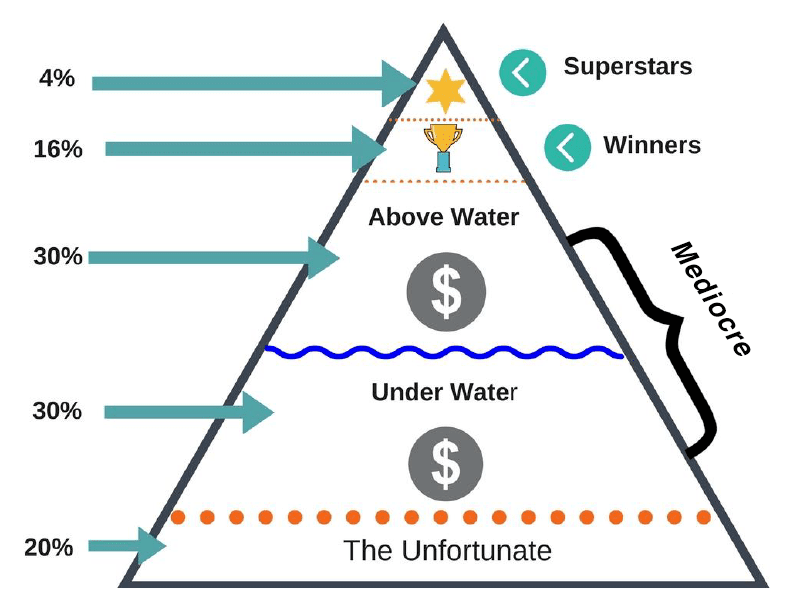Ask yourself the following questions:
- Is each sales team member making sales based on their weekly financial needs?
- Are your people earning income while they're learning sales skills?
- re they being held accountable for their daily and weekly activities?
- Are your salespeople loyal to you, your company, and their teammates?
- Is each salesperson worthy of being hired back next week based on their performance this week?
Your salespeople's success is not based on their ability to close a sale; instead, it is about being part of a superior sales team. A great team generates a healthy environment wherein people help each other to learn and grow.
So, don't "hire" a salesperson; instead, select the psychologically right person who’s a good fit for you and your team.
Selling isn’t for everyone. Unless properly vetted, most will fail. Sales is one of the most demanding careers on the planet. The turnover among salespeople is double the rate of any other career path.
Hiring the wrong person is extremely expensive. The financial loss incurred by turnover is estimated to be four hundred percent of an employee’s potential annual income. In addition, turnover introduces the fear factor to the remaining loyal employees, and their fear cripples their performance.
For an investment of under a hundred dollars, a Behavior Assessment is a must. You are searching for people with a high level of conscientiousness who are also emotionally stable. The glibbest and the best talkers are often best left at the party. Don’t be fooled!
Too often, sales managers focus on the high-performers, but long-term success will come from selecting slightly above-average associates and concentrating on them. Your goal is to increase sales by developing average associates into above-average sales professionals who are loyal and have a long-term commitment to you, your company, and your team.
Before you begin recruiting, it’s essential to evaluate your existing team so you know what you have to work with and who should be replaced. When you look at the pyramid below, consider where you’d place each of your sales associates.

Superstars
Superstars create sales volume, which makes them extremely valuable to your company. However, their value also makes you vulnerable.
Often these prima donnas are challenging to manage. They create management nightmares, and you may discover that you are educating your competition since they are also difficult to retain. In addition, they can be disruptive and may passively undermine your leadership.
There is no room on a team for superstars who aren’t team players, but there is room for superstar leaders who are committed to achieving corporate goals and eager to build a team under your branded umbrella.
Winners
These are the folks who, when properly trained, have the potential to earn a six-figure income. Behavioral profiling shows that some sales associates “get it” and do a better job of organizing themselves. Others in this category have a lot of natural talent or charisma. A smaller percentage of them are internally driven with a strong will to win.
Mediocre (Above and Underwater)
Mediocre is a much larger group, making up 60% of your sales team. We suggest you focus your efforts on recruiting, training, and building a solid and sustainable sales team within this group. Mediocre associates appreciate your mentoring and express that appreciation with loyalty. They are also much easier to manage.
Unfortunately, many in the underwater group are forced out of business by economic necessity. They don’t earn enough money to stay in business with you long enough to learn and survive. Sadly, when they run out of money, they also run out of enthusiasm and optimism, and you may have to help them leave, which is often best for them and protects the morale of your team.
Be aware that poor performance may be due to a lack of experience. Therefore, if a poor performer is following the system and shows a strong desire to improve, keep them. Assigning the poor performer to a team headed by a top closer for a 50% split on sales initiated by the poor performer may be worth the risk.
Favoritism Kills
Save your time when it comes to recruiting. If you are the top sales executive for your company, don’t get caught in the trap of doing the initial interviews for new applicants. This is particularly true if the applicant has been referred to you by a friend or business associate. It's much more difficult to be objective when there are personalities or favors involved. Favoritism will kill the morale of your sales team.
To be objective, you want to have some distance between you and prospective salespeople. Professional recruiters may be able to help you with this challenge.
When it comes to recruiting, you can’t know too much about someone you are inviting to live a third of their life with you. Responding to the tyranny of the urgent and selecting the wrong person because you’re in a hurry is far more costly than taking the time to choose the right person. Remember, you are “selecting,” not hiring.
Only recruit people who want to be of service. It doesn’t matter if they’re good-looking, tall, short, skinny, or fat. The only thing that matters is that they are eager to be of service and are financially hungry.
Select individuals who need to earn money and appreciate the value of making a six-figure income! Don’t select anyone who is deeply in debt or who has been foolish with their money and is financially “underwater.” Select people who have proven that they have developed healthy financial habits. Don’t hope; look at the stats, and do the right thing.
No matter how careful you may be in the selection process, each person will bring mental and emotional baggage to work. And for that reason, you want to choose the ones with the fewest “moving parts.”
Go slow and select the right people who have been vetted by several people you trust. You aren’t hiring anyone, you are interviewing applicants, and from the many, you select one. Never hire in a hurry, but fire in a hurry once you know the person isn’t going to make it.

